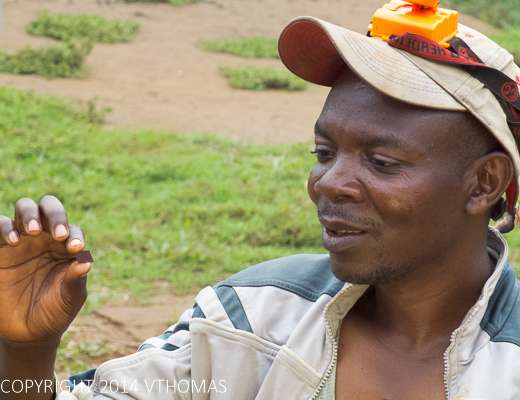Does conflict-free sourcing matter?

When consumers make the decision to purchase a tablet, they're probably not thinking about violence in the Democratic Republic of the Congo—but they should.
From a morning run on the treadmill to an evening commute on the train—and every moment of tech-enabled distraction in between—most people often don't realize that their devices can negatively impact miners in the Democratic Republic of the Congo (DRC). By sourcing conflict-free minerals and raising awareness, however, many companies, organizations and consumers are helping to change the status quo and make a difference.
"Seventy percent of tin, tantalum and tungsten mines surveyed across several provinces in eastern Congo are no longer controlled by armed actors," explained Sasha Lezhnev, Associate Director of Policy for the Enough Project, citing a 2014 survey from the International Peace Information Service. "Furthermore, as of November 2015, 141 mines in eastern Congo have been certified as conflict-free, and 206 smelters/refiners worldwide have passed conflict-free audits."
The Enough Project, which works to end genocide and crimes against humanity, has collaborated on many conflict-free initiatives, including Intel's project to build a conflict-free supply chain for all products in 2016.
"The minerals are important, but not as important as the lives of the people who work to get them," Intel CEO Brian Krzanich explained at the Consumer Electronics Show in Las Vegas in January 2014.
"We have an obligation to implement changes in our supply chain to ensure that our business and our products are not inadvertently funding human atrocities."
The human atrocities Krzanich refer to are a product of the war-torn DRC. In a Central African country rich with natural resources, Congolese miners often endure horrific living conditions, violence and oppression from militias whose conquests are funded by so-called "conflict minerals."
These minerals include tin, tungsten, gold and tantalum—and are used to build everything from treadmills and trains to tablets and smartphones.
Extracting these minerals is arduous work. Mining is dangerous, and workers use rudimentary tools like shovels, iron bars and hammers to extract the minerals from hard rock before cleaning them and getting them ready to sell.

While workers do not receive a large pay-out for their labor, conflict minerals constitute a multi-million dollar trade industry. Until recently, there's been little incentive for anyone—from governments to multi-national tech companies—to stop using conflict minerals.
Krzanich issued a challenge to consumers to consider where their products come from and buy accordingly. He rallied other industry leaders to examine their own supply chains.
Back in 2009, Carolyn Duran, a supply chain director for Intel, worked to address the conflict mineral issue. She eventually traveled to smelters in 21 countries to present the case for why conflict-free purchasing matters.
"That's not my problem or I don't need to do this," said Duran, describing initial reactions from some in Intel's supply chain.
This began to change after customers began requesting validation of conflict-free sourcing of minerals before purchasing them.
"They actually changed their systems," Duran said, which for everyone was a better outcome than not sourcing from the DRC altogether because that would have harmed even legitimate miners.
"We saw smelters changing their behavior. That's when I knew that the supply-chain pressure was paying off," she continued. "You can't solve a problem by abandoning it. You have to start over by reconnecting the dots and convincing partners to do the right thing."
Today, Intel uses conflict-free minerals in all of its microprocessors, and the global Conflict-Free Sourcing Initiative (CFSI) has taken off.

That's just the beginning: Approximately 200 companies and associations from seven countries are a part of CFSI, working to ensure their supply chains use conflict-free sourcing and helping to promote stability and peace in the DRC.
Intel has committed to build a conflict-free supply chain for all products in 2016, but the conflict-free initiative has already made a difference. According to The Impact of Dodd-Frank and Conflict Minerals Reforms on Eastern Congo's Conflict, the result of these efforts has helped realize a 55 percent reduction in armed-group profits from the tin, tungsten and tantalum mined in the region.
"Once you believe and witness the things that you are doing in the supply chain can actually make an impact on the ground, it's almost impossible not to be passionate about it," Duran said.
"We all, large and small companies, need to work together to drive change."

And despite all the progress, there's still more to be done. Lezhnev encourages consumers to continue conducting product research and questioning companies on their conflict-free policies.
"By spreading awareness and becoming engaged in the movement for conflict-free minerals from Congo, consumers can help shape the sourcing practices of companies and demand that their products support peace, rather than conflict," he said. "Students and young people in particular play a pivotal role in this movement, and can learn more about how to get involved at the Conflict-Free Campus Initiative."
"Conflict free" and "conflict-free" means "DRC conflict free", which is defined by the U.S. Securities and Exchange Commission rules to mean products that do not contain conflict minerals (tin, tantalum, tungsten and/or gold) that directly or indirectly finance or benefit armed groups in the Democratic Republic of the Congo (DRC) or adjoining countries. We also use the term "conflict-free" in a broader sense to refer to suppliers, supply chains, smelters and refiners whose sources of conflict minerals do not finance conflict in the DRC or adjoining countries.

Provided by Intel

















